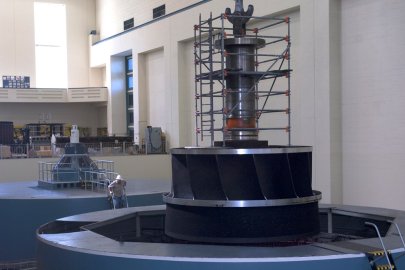National laboratory researchers examined and published a report on how climate change may affect water availability for federal hydropower marketing and generation and its impact on future energy demand.
Water Power Technologies Office
March 14, 2024Hydropower Program
Environmental and Hydrologic Systems Science
Project Name: Third Assessment of the Effects of Climate Change on Hydropower
Project Team: Oak Ridge National Laboratory (lead), Pacific Northwest National Laboratory, Texas A&M University, and the Federal Power Marketing Administrations
Lead Recipient Location: Oak Ridge, Tennessee

Researchers at Oak Ridge National Laboratory, with support from Pacific Northwest National Laboratory, Texas A&M University, and the federal power marketing administrations, examined how climate change may affect water availability for federal hydropower marketing and generation and its impact on future energy demand. The resulting report, Third Assessment of the Effects of Climate Change on Federal Hydropower, provides stakeholders with state-of-the-art hydroclimate projections to support smart and informed energy planning.
Intensified climate conditions represent one of the most critical issues threatening power system and infrastructure resilience. Researchers expect climate change to create contrasting conditions that include increased temperatures, more intense flood and drought, and shifts in peak streamflow timing due to earlier snowmelt. In addition, rising temperatures may lead to increased evaporation from reservoirs and more energy demand during summer and fall.

The Third Assessment of the Effects of Climate Change on Federal Hydropower provides stakeholders with state-of-the-art hydroclimate projections to support smart and informed energy planning.
Identifying and understanding the ways these climate change impacts may affect the federal hydropower fleet is essential for the power marketing administrations to continue to provide hydropower to their customers, which largely consist of publicly owned and cooperative-owned utilities, at the lowest possible rate. Mitigation actions will be needed to adapt to the effects of earlier snowmelt, changing timing of water supply/demand, and other extreme events. Conventional reservoir operation practices may need to be reexamined to account for changing climate conditions and energy demand.
The Third Assessment of the Effects of Climate Change on Federal Hydropower report resulted from the SECURE Water Act of 2009, which directed the U.S. Department of Energy to evaluate the risk of climate change on federal hydropower generation. The latest version of the report builds on two previous ones and incorporates the latest climate change projections from international global climate modeling efforts. The research team is now expanding the assessment for the broader nonfederal hydropower fleet.
-
 Pacific Northwest National Laboratory supported the 25th annual Salmon Summit, an educational event in eastern Washington designed in part to inspire the next generation of hydropower researchers, diverse STEM professionals, and a science-aware community.
Pacific Northwest National Laboratory supported the 25th annual Salmon Summit, an educational event in eastern Washington designed in part to inspire the next generation of hydropower researchers, diverse STEM professionals, and a science-aware community. -
 National laboratory researchers examined and published a report on how climate change may affect water availability for federal hydropower marketing and generation and its impact on future energy demand.
National laboratory researchers examined and published a report on how climate change may affect water availability for federal hydropower marketing and generation and its impact on future energy demand. -
 Researchers used a variety of sampling techniques to consistently and accurately measure methane and carbon emissions from six hydropower reservoirs
Researchers used a variety of sampling techniques to consistently and accurately measure methane and carbon emissions from six hydropower reservoirs -
 A biodegradable and nontoxic hydropower oil has gone through several rounds of testing as its developer aims to ramp up production to achieve commercialization in the next few years.
A biodegradable and nontoxic hydropower oil has gone through several rounds of testing as its developer aims to ramp up production to achieve commercialization in the next few years. -
 Oak Ridge National Laboratory improved upon fish species detection and counting using environmental DNA and RNA sequencing, potentially saving time, decreasing costs, and reducing environmental impacts on aquatic species and habitats.
Oak Ridge National Laboratory improved upon fish species detection and counting using environmental DNA and RNA sequencing, potentially saving time, decreasing costs, and reducing environmental impacts on aquatic species and habitats. -
 A new, nontoxic antibiofouling coating reduced the adhesion of algae, mussels, and larva on flat surfaces, rope, nets, and other materials used in the hydropower and marine energy sectors.
A new, nontoxic antibiofouling coating reduced the adhesion of algae, mussels, and larva on flat surfaces, rope, nets, and other materials used in the hydropower and marine energy sectors.
WPTO's hydropower e-newsletter features news on R&D and applied science to advance sustainable hydropower and pumped-storage technologies.
The WPTO e-newsletter brings funding opportunities, events, publications, & hydropower and marine energy updates directly to your inbox.


